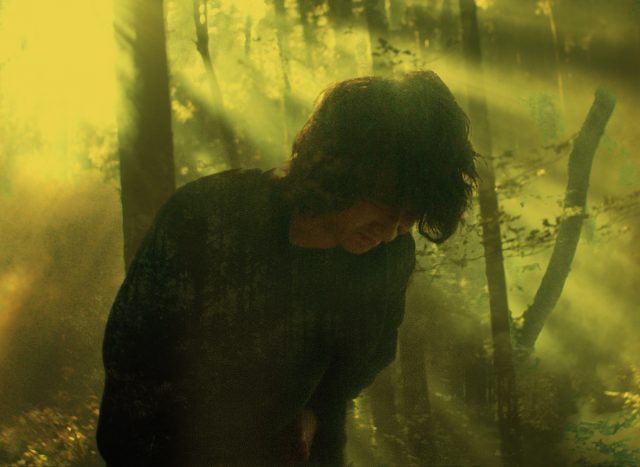
Soro Hakimoto’s Haruneko takes viewers into the strange and alluring dark night of the soul
FESTIVAL OF NEW JAPANESE FILM: HARUNEKO (SPRING CAT) (はるねこ) (Soro Hakimoto, 2016)
Japan Society
333 East 47th St. at First Ave.
Sunday, July 16, 8:45
Festival runs July 13-23
212-715-1258
www.japansociety.org
www.haruneko-movie.com
 Writer, director, editor, and composer Soro Hakimoto’s cinematic debut, Haruneko, opens with a swirling, unidentifiable image and gently haunting music featuring portentous voices that fade away as a misty forest emerges and an old white car appears, complete with a black cat. “Let’s sing,” the young driver (Keisuke Yamamoto) mumbles to himself as an old man (Yohta Kawase) looks steadily in front of him in the backseat. It’s an alluring beginning to a film that includes so many classic Japanese movie tropes: ghosts, ominous felines, yakuza, a mysterious forest, sudden bursts of singing, poorly translated subtitles, and a perplexing plot. Amid a lush green landscape is a lone cabin, where people come to die. It is operated by the Manager (Yamamoto) with the help of a young boy named Haru (Ryuto Iwata); also there are the boy’s piano-playing sister (Minako Akatsuka), their grandmother (Lily), and an old man (Min Tanaka) who sits in a rocking chair on the porch. In the middle of the forest is a dark area where the Manager, dressed in a striking white tuxedo, hosts a magic lantern show, spouting poetry and breaking out into uplifting J-pop as slides of a person’s life are projected onto a screen. “Petals are dancing in the wind to celebrate our meeting and departing,” the Manager says. “What is what you see to you? What is not what you don’t see to you?” Later the café is visited by a distraught and crazed yakuza on the run (Yo Takahashi) and a longhaired man (Llon Kawai) with a selfie stick who has committed a horrific atrocity, both seeking, in their own ways, to end their misery. Through it all, the residents of the café remain calm and understanding as their visitors face their destiny.
Writer, director, editor, and composer Soro Hakimoto’s cinematic debut, Haruneko, opens with a swirling, unidentifiable image and gently haunting music featuring portentous voices that fade away as a misty forest emerges and an old white car appears, complete with a black cat. “Let’s sing,” the young driver (Keisuke Yamamoto) mumbles to himself as an old man (Yohta Kawase) looks steadily in front of him in the backseat. It’s an alluring beginning to a film that includes so many classic Japanese movie tropes: ghosts, ominous felines, yakuza, a mysterious forest, sudden bursts of singing, poorly translated subtitles, and a perplexing plot. Amid a lush green landscape is a lone cabin, where people come to die. It is operated by the Manager (Yamamoto) with the help of a young boy named Haru (Ryuto Iwata); also there are the boy’s piano-playing sister (Minako Akatsuka), their grandmother (Lily), and an old man (Min Tanaka) who sits in a rocking chair on the porch. In the middle of the forest is a dark area where the Manager, dressed in a striking white tuxedo, hosts a magic lantern show, spouting poetry and breaking out into uplifting J-pop as slides of a person’s life are projected onto a screen. “Petals are dancing in the wind to celebrate our meeting and departing,” the Manager says. “What is what you see to you? What is not what you don’t see to you?” Later the café is visited by a distraught and crazed yakuza on the run (Yo Takahashi) and a longhaired man (Llon Kawai) with a selfie stick who has committed a horrific atrocity, both seeking, in their own ways, to end their misery. Through it all, the residents of the café remain calm and understanding as their visitors face their destiny.
Produced by Shinji Aoyama (Eureka, Tokyo Park) and Takenori Sento (Ringu, H Story), the film recalls Apichatpong Weerasethakul’s elegiac Uncle Boonmee Who Can Recall His Past Lives, an exquisite tale of death and rebirth. Hokimoto made Haruneko shortly after the loss of his father, a stage designer, and there are certainly elements that evoke a man’s trying to come to terms with just what death is. Not all of it makes sense — wait till you see the band made up of adults in white cat masks — but Hokimoto is not overly concerned with that, instead concentrating on stunning visuals courtesy of documentary cinematographer Yoi Suzuki and glorious musical numbers. There are also some very funny moments alongside all the weirdness. “Reveal everything. Admit everything. Show everything. Get out everything. Hide nothing,” the Manager sings as men and women in black dance wildly and the forest comes alive with electrifying energy. Haruneko is making its North American premiere July 16 at 8:45 in the Experimental Spotlight section of Japan Society’s Japan Cuts: Festival of New Japanese Cinema, which continues through July 23 with such other works as Konrad Aderer’s Resistance at Tule Lake, Akira Nagai’s Teiichi: Battle of Supreme High, Sion Sono’s Anti-Porno, and Jean-Gabriel Périot’s Summer Lights.